Audi Q5 vs VW Tiguan - Differences and prices compared
Compare performance (367 HP vs 272 HP), boot space and price (44800 £ vs 33300 £ ) at a glance. Find out which car is the better choice for you – Audi Q5 or VW Tiguan?
Costs and Efficiency:
Price and efficiency are key factors when choosing a car – and this is often where the real differences emerge.
VW Tiguan has a evident advantage in terms of price – it starts at 33300 £ , while the Audi Q5 costs 44800 £ . That’s a price difference of around 11528 £.
Fuel consumption also shows a difference: VW Tiguan manages with 1.40 L and is therefore convincingly more efficient than the Audi Q5 with 2.50 L. The difference is about 1.10 L per 100 km.
As for electric range, the VW Tiguan performs noticeable better – achieving up to 126 km, about 26 km more than the Audi Q5.
Engine and Performance:
Under the bonnet, it becomes clear which model is tuned for sportiness and which one takes the lead when you hit the accelerator.
When it comes to engine power, the Audi Q5 has a evident edge – offering 367 HP compared to 272 HP. That’s roughly 95 HP more horsepower.
In acceleration from 0 to 100 km/h, the Audi Q5 is noticeable quicker – completing the sprint in 4.50 s, while the VW Tiguan takes 5.90 s. That’s about 1.40 s faster.
In terms of top speed, the Audi Q5 performs hardly perceptible better – reaching 250 km/h, while the VW Tiguan tops out at 242 km/h. The difference is around 8 km/h.
There’s also a difference in torque: Audi Q5 pulls evident stronger with 550 Nm compared to 400 Nm. That’s about 150 Nm difference.
Space and Everyday Use:
Whether family car or daily driver – which one offers more room, flexibility and comfort?
Both vehicles offer seating for 5 people.
In curb weight, VW Tiguan is a bit lighter – 1599 kg compared to 1910 kg. The difference is around 311 kg.
In terms of boot space, the VW Tiguan offers noticeable more room – 652 L compared to 520 L. That’s a difference of about 132 L.
In maximum load capacity, the VW Tiguan performs to a small extent better – up to 1650 L, which is about 177 L more than the Audi Q5.
When it comes to payload, Audi Q5 minimal takes the win – 565 kg compared to 533 kg. That’s a difference of about 32 kg.
Who comes out on top?
Overall, the VW Tiguan shows itself to be wins the duel decisively and secures the title of DriveDuel Champion.
It convinces with the more balanced overall package and proves to be the more versatile choice for everyday use.

VW Tiguan
Costs and Consumption
View detailed analysis
Engine and Performance
View detailed analysis
Dimensions and Body
View detailed analysis
Audi Q5
The Audi Q5 feels like the sensible luxury choice — polished cabin materials, a calm ride and enough tech to keep commuters and weekend adventurers equally pleased. It won't shout for attention but will quietly check the boxes for buyers who want refinement, space and everyday usability with a dash of Audi charisma.
details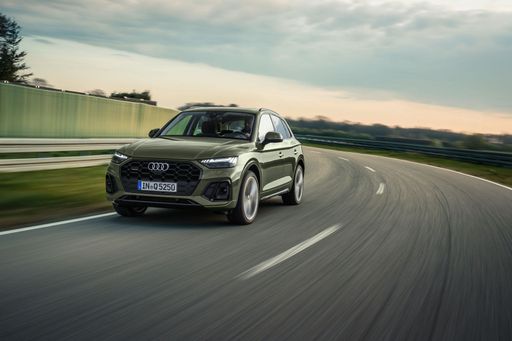
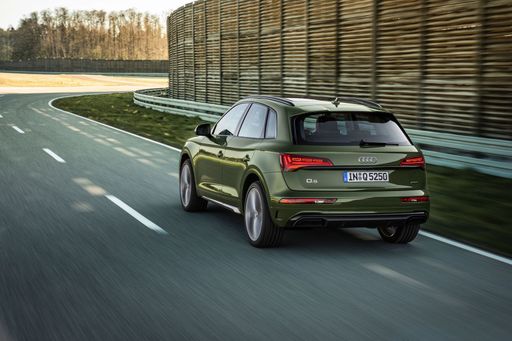

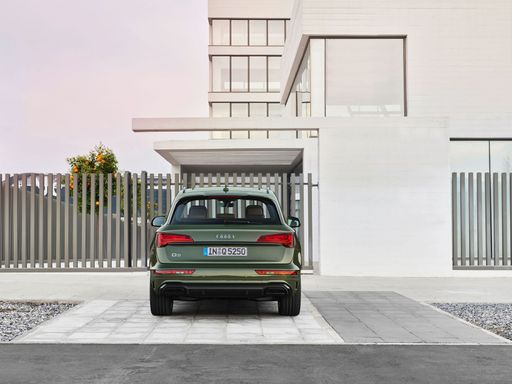
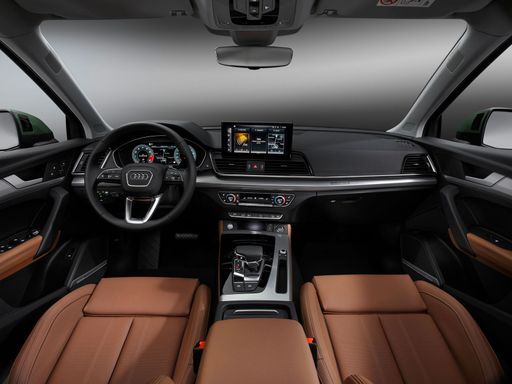
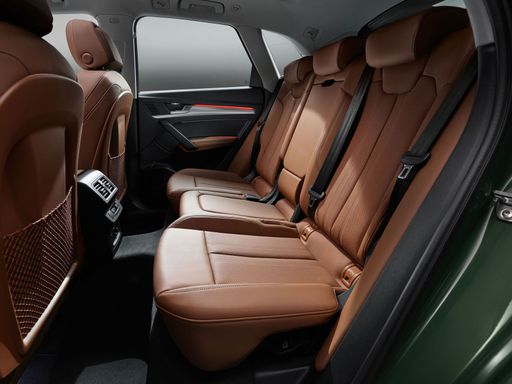
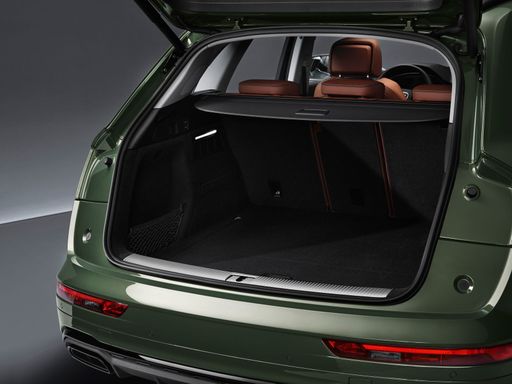
VW Tiguan
The VW Tiguan blends sensible family practicality with a dash of German polish, delivering a calm, reassuring ride and a cabin that never feels like an afterthought. For buyers who want an SUV that’s easy to live with yet still nicely dressed, the Tiguan is the grown‑up choice that keeps a cheeky wink in reserve.
details





Costs and Consumption |
|
|---|---|
|
Price
44800 - 78900 £
|
Price
33300 - 51900 £
|
|
Consumption L/100km
2.5 - 8.3 L
|
Consumption L/100km
1.4 - 8.4 L
|
|
Consumption kWh/100km
-
|
Consumption kWh/100km
-
|
|
Electric Range
92 - 100 km
|
Electric Range
118 - 126 km
|
|
Battery Capacity
-
|
Battery Capacity
19.70 kWh
|
|
co2
56 - 189 g/km
|
co2
32 - 190 g/km
|
|
Fuel tank capacity
65 L
|
Fuel tank capacity
45 - 58 L
|
Dimensions and Body |
|
|---|---|
|
Body Type
SUV
|
Body Type
SUV
|
|
Seats
5
|
Seats
5
|
|
Doors
5
|
Doors
5
|
|
Curb weight
1910 - 2245 kg
|
Curb weight
1599 - 1890 kg
|
|
Trunk capacity
433 - 520 L
|
Trunk capacity
490 - 652 L
|
|
Length
4717 mm
|
Length
4539 mm
|
|
Width
1900 mm
|
Width
1842 - 1859 mm
|
|
Height
1647 - 1656 mm
|
Height
1656 - 1658 mm
|
|
Max trunk capacity
1388 - 1473 L
|
Max trunk capacity
1486 - 1650 L
|
|
Payload
490 - 565 kg
|
Payload
460 - 533 kg
|
Engine and Performance |
|
|---|---|
|
Engine Type
Plugin Hybrid, Petrol MHEV, Diesel MHEV
|
Engine Type
Petrol, Petrol MHEV, Diesel, Plugin Hybrid
|
|
Transmission
Automatic
|
Transmission
Automatic
|
|
Transmission Detail
Dual-Clutch Automatic
|
Transmission Detail
Dual-Clutch Automatic
|
|
Drive Type
All-Wheel Drive, Front-Wheel Drive
|
Drive Type
All-Wheel Drive, Front-Wheel Drive
|
|
Power HP
204 - 367 HP
|
Power HP
130 - 272 HP
|
|
Acceleration 0-100km/h
4.5 - 8.6 s
|
Acceleration 0-100km/h
5.9 - 10.6 s
|
|
Max Speed
226 - 250 km/h
|
Max Speed
210 - 242 km/h
|
|
Torque
340 - 550 Nm
|
Torque
220 - 400 Nm
|
|
Number of Cylinders
4 - 6
|
Number of Cylinders
4
|
|
Power kW
150 - 270 kW
|
Power kW
96 - 200 kW
|
|
Engine capacity
1968 - 2995 cm3
|
Engine capacity
1498 - 1984 cm3
|
General |
|
|---|---|
|
Model Year
2025
|
Model Year
2024 - 2025
|
|
CO2 Efficiency Class
B, E, F, G
|
CO2 Efficiency Class
G, D, E, F, B
|
|
Brand
Audi
|
Brand
VW
|
What drivetrain options does the Audi Q5 have?
The Audi Q5 is available as All-Wheel Drive or Front-Wheel Drive.




